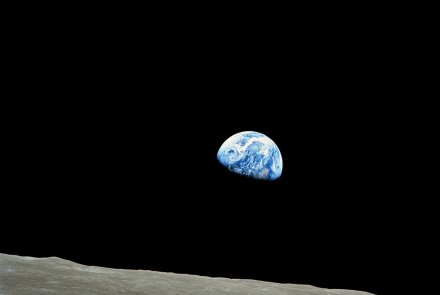
WikiImages on Pixabay https://pixabay.com/en/earth-soil-creep-moon-lunar-surface-11014/
The next great transformation
Whatever the future offers, the global change we are seeing is most certainly not business as usual. What comes next is up to us, Quentin Grafton writes.
Global governance first arose with the League of Nations. The aspiration was to build a ‘community of nations’ that promoted peace and prosperity.
The League of Nations, though, was unsuccessful at stopping state aggression. In its place, after World War II, came the United Nations. The UN had at its core a multilateral agenda with the intent, through the Security Council, to constrain the actions of predatory states while promoting peace and prosperity.
Supported by a dominant superpower, the US, this agenda more or less succeeded and the UN provided the framework for global action. The world is, indeed, much more prosperous, and while there have been proxy wars between powerful states since 1945, there has been no global conflict. To this end, the UN and its many related organisations did help and were instrumental in key successes, such as the eradication of smallpox.
But to paraphrase the words of Dag Hammarskjöld, the UN’s Second Secretary-General, the UN has served its purpose to “save us from hell”, but it has not delivered us to heaven.
Global governance is multilateralism writ large. Outside of the UN’s multilateralism the most important example is the rise of supranational governance in the European Union. Its multiple institutions and treaties have transformed a continent that had suffered two devastating wars within a generation in the 20th century.
The 1990s were, perhaps, the high water mark for multilateralism and possibly also of global governance. This was the time of the first Earth Summit in Rio that led to the UN Framework Convention on Climate Change in June 1992.
By contrast, today, in 2016 global governance is in a crisis. There are more displaced people today than at any other time in history, the world faces grave global risks such as climate change, but also in terms of food and water security or what might be better termed ‘human security’.
Today we are seeing a clear trend away from openness to the ‘closing of doors’ of nations to people, trade and even ideas. It is in this world of mega-risks that the incremental and ‘steady as she goes’ approach and the striving for consensus which characterises multilateral approaches to governance appears inadequate. Not surprisingly, people and their governments are looking elsewhere for answers.
While today has similarities to the 1930s when the League of Nations failed to avert the world from catastrophe we have, so far, avoided the paths to war. Nevertheless, we remain at a point where the likelihood of a major conflict between two or more of the world’s biggest powers is much greater than it has been for decades. The business-as-usual trends in human security and how to reconcile soil health, water availability and food requirements by 2050 makes the next 25 years or so arguably the most significant in human history.
While the rhetoric is global, the climate change agreement in Paris in December last year is very much at a sovereign state level and the Intended Nationally Determined Contributions (INDCs) of signatory countries to climate change mitigation is about individual country commitments. While some have interpreted these aspirational targets as a triumph for global governance, they are not. Regardless of the treaty, and when it is ratified, climate change mitigation will be determined by nation-states guided by their targets and aspirations and interests, and not UN organisations based in New York or elsewhere.
The response to perceived global governance weaknesses and failures has been proposals to ‘reboot’ the UN. There are dozens of proposals of how this might be done, the latest of which comes from the Independent Commission on Multilateralism and the International Peace Institute.
My answer to the challenges of global governance is fundamentally different. Instead of ‘top-down’ reform of the UN, the world needs a ‘people push’ supported by individuals, families and their communities. As we have seen in the Brexit vote, and also the rise of nationalist and anti-globalization political parties, people are reaching out to grab back the control they think they need at the national level. This is an understandable response to failed leadership that simply has not recognised the concerns of many who feel that their lives are not getting better, and want something done about it.
This transformation is being seen in France, the Philippines, the US and other places. It is a global phenomenon, but paradoxically is a ‘pushback’ against globalization. As with any reformation this pushback has its ugly side with the rise of the populist demagogue, many of whom will say what is needed to get into power, but then act in their own interest rather than the public interest.
The path ahead as people seek to ‘take back their lives’ will be messy. There will, no doubt, be ‘wrong turns’ along the road as people get misled by the populists, the wrong people get blamed for governance failures, and leaders seek to use the angst of many to offer simplistic solutions to complicated problems. Nevertheless, the shift to ‘people power’ and direct engagement with citizens and their concerns is underway. It will take some of the power away from the ‘technocrats’, the ‘meritocrats’, and even the ‘fat cats’. It will help to democratise power. Whatever it offers, this global change is most certainly not business as usual.
Ultimately, the way to respond to the risks of climate change and business as usual projections that have the world requiring 60 per cent more food, 50 per cent more water and at least 40 per cent more energy by 2050 is simple: use the best available evidence; consider what really matters and base decisions on values and not slogans; and allow people to own the decisions that they make.
There really is no alternative.
As John Maynard Keynes reportedly said, “When the facts change, I change my mind. What do you do sir?” We can ride the great transformation underway and make it work for us and make sure we do what needs to be done to sustainably feed the extra two billion people or more in our world by 2050. Or we can fight it. Or simply bury our heads in the sand.
The world is changing, we need to change how we do business and how we govern ourselves. We should do this, we can do this, and we must do this to make this great transformation underway work for us. Our very future depends on it.
This article was first published by Policy Forum.net, the website of the Asia and the Pacific Policy Society and Crawford School. http://www.policyforum.net/next-great-transformation/
Updated: 28 July 2024/Responsible Officer: Crawford Engagement/Page Contact: CAP Web Team













